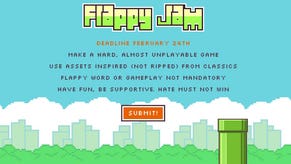Welcome to the Jam: The Making of Super Street Harassment RPG
Critic becomes creator as USgamer's Bob Mackey puts his skills to the test throughout a grueling, game-making weekend.
This article first appeared on USgamer, a partner publication of VG247. Some content, such as this article, has been migrated to VG247 for posterity after USgamer's closure - but it has not been edited or further vetted by the VG247 team.
There's a certain fallacy we critics hear often: That our lot are nothing more than frustrated artists, seeking to tear other people's work down rather than create something worthwhile ourselves.
Of course, I don't think I need to spend too much time poking holes in this paper-thin argument, because the worlds of art and criticism aren't necessarily mutually exclusive. But it seems that no matter how much work a critic has behind them, it's impossible to evade this rotten, old chestnut. Up until his final years, at the end of a four-decade legacy, the venerated Roger Ebert still had to deal with people pointing out the fact that his sole screenplay credit could be found in 1969's Beyond the Valley of the Dolls, a provacative piece of sexplotation that's gone on to become a cult classic. This dalliance amounted to a six-week writing gig for Ebert—a drop in the ocean of his career—yet, this Russ Meyer collaboration found itself wheeled out as damning evidence every time he hated, hated, hated a movie.

Video games may be a much different medium than films, but the critic's relationship to this art form remains the same: Through years absorbing and writing about media, we internalize a set of qualities that define "good" for us—though it's always nice to have these parameters redefined. And while not all of us aspire to make the kind of things we analyze, I'd wager most of us could plead guilty of daydreaming. Spending so much time thinking about the platonic ideal of an experience often leads to wild visions of an idealized game that achieves its goals as intended—luckily, the human imagination isn't hampered by practical concerns like budgets, production bottlenecks, or intra-office conflict.
So, I guess it was inevitable that my chosen path in life would eventually lead me to prove the untold thousands of hours spent holding a controller could apply to more than one role. Between May 8 and May 10, I attended The CSU East Bay Game Jam, a three-day event in Hayward, California, normally intended for students of the university, but apparently also open to anyone with curiosity and press privilege. And if three days sounds like a tiny window of time to make a game, know that this event really occupied roughly two-and-a-half rotations of the earth—and unlike professional game developers, we were set free at the end of every day to eat, recuperate, and see our loved ones.
By the end of the event, my team and I had something to show for our hard work: Super Street Harassment RPG, a functional prototype that communicates the effects of this real-life issue via the turn-based battles of Pokemon or Dragon Quest. Reaching this point, however, would take a grueling journey, full of brainstorming, experimenting, and frustration—and this is coming from the team member whose barely applicable skills ultimately led to the least amount of work.





